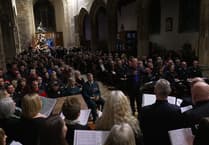The Welsh Ambulance Service is moving closer to using drones to fly defibrillators to patients.
The Trust has partnered with the University of Warwick and industry partners SkyBound to explore whether drone-delivered defibrillators could make a difference to someone in cardiac arrest.
Carl Powell, the Welsh Ambulance Service’s Clinical Lead for Acute Care, said: “In a cardiac arrest, every second counts.
“We will always send an ambulance as quickly as possible on lights and sirens, but starting chest compressions and delivering an electric shock with a defibrillator in the meantime could mean the difference between life and death.
“If you’re helping someone in cardiac arrest, it might be difficult to find a defibrillator soon enough to make a real difference, especially in rural areas and especially if you’re the only person there, which is why we’re thinking about better ways to get help to patients.
“In Sweden, ambulance services have used flying drones to deliver defibrillators to people after cardiac arrest.
“Nobody has yet demonstrated how we could do this in the UK – until now.”
Professor Nigel Rees, the Trust’s Assistant Director of Research and Innovation, said: “Drone-delivered defibrillators might sound like something from a sci-fi movie, but if it’s the quickest way to get a defibrillator to a patient, it’s a fantastic tool in our locker to improve survival rates.”
Funding from Resuscitation Council UK enabled the Drone-Delivered Defibrillators study – or ‘3D Project’ – to conduct a number of test flights to demonstrate the feasibility of delivering a defibrillator via drone after a 999 call.
Further funding from the National Institute of Health Research and Health and Care Research Wales has enabled the 3D Project to enter its next phase, which is to interview people who have helped someone in a real-life cardiac arrest to understand the difference that a drone-delivered defibrillator could have made.
This summer, researchers will also perform long-distance ‘beyond visual line of sight’ flights to demonstrate how real-time communications between the 999 control room and a drone operation team would work during a cardiac arrest call.
Dr Christopher Smith, Clinical Lecturer in Emergency Medicine at the University of Warwick, said: “Early CPR and defibrillation are crucial if we are to improve survival from out-of-hospital cardiac arrest.
“Drones may be one way of getting a life-saving defibrillator to more patients faster than before.”
The project is due to conclude in October, with the results available in early 2025.

_cropped.jpeg?width=209&height=140&crop=209:145,smart&quality=75)



Comments
This article has no comments yet. Be the first to leave a comment.